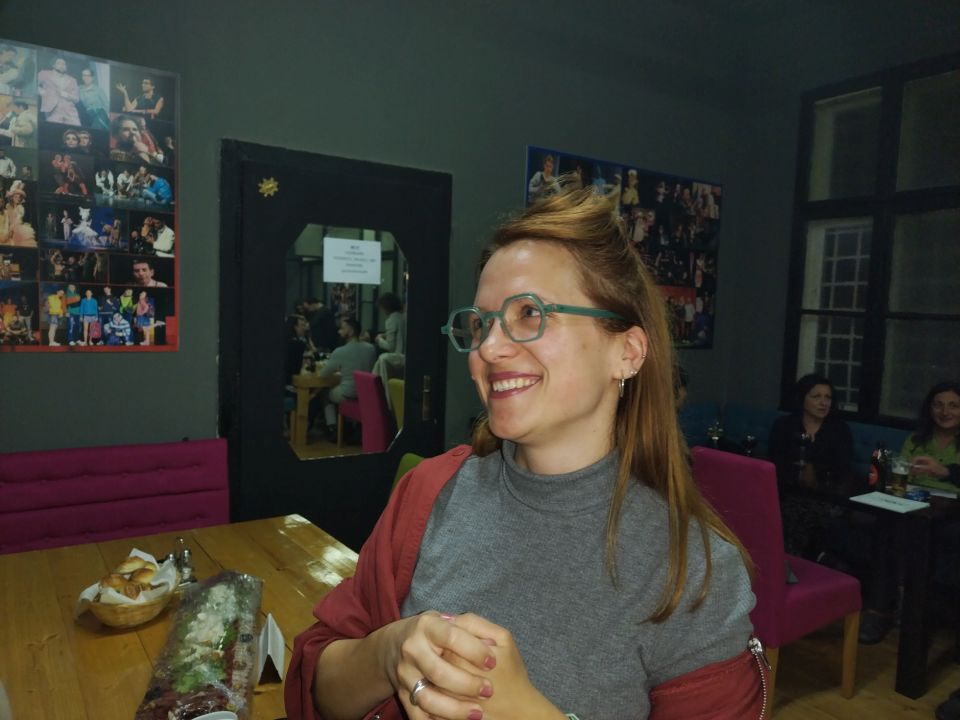The world is not a place only for man, others should live too. Hey man, get that. This is what the play "Do Birds Have the Capacity for Fun?" of the Bitef Theater speaks about - about the future, a grain of hope and a warning on this island of hopelessness of ours called planet Earth. The play, which was based on the text by Tijana Grumić, was directed by Nikola Isaković, and the children of Novi Sad have never seen anything like it before. Drones were flying around them, the vacuum cleaner was talking, the computer screen was moving, the light bulbs were turning on and off by themselves, some healing, beautiful music could be heard... We talked to Tijana Grumic about the play "Do Birds Have the Capacity for Fun?" which talks about the apocalypse we are spiraling to, and which, after the tragedy that happened in Belgrade on May 3, seems to us only as hope.
How to humanize a man, that's what your play is about, that's what we're talking about these days, confused and terrified by what happened in Belgrade on May 3rd?
By giving him the opportunity to be with other people, to share time with them, to share love, support, compassion and to be present in the stories that still give hope.
How to tell stories to children, we asked ourselves even before May 3rd, and now we are asking the same thing even more and louder? How to tell them stories in the theater?
In the most serious way possible. There is often an idea among creators that children should be patronised, that they should talk about topics in a certain, perhaps more specific way... I actually think that they deserve the same seriousness as adult audience. That's how they should be approached. Children sometimes understand more than we objectively give them credit for. And in this sense, I believe that children's theater must also talk to children as if they were our equals. That's the only way we'll get to some dialogue, teamwork, that's the only way we'll understand what they need and what's important to them.
How did you come up with the idea for this play? It's amazing how many associations there are, what you thought of, what was loaded onto the scene...
Director Nikola Isaković had the idea of doing something in the form of a theater object. It is a subtype of puppet theater in which objects are used, and Nikola wanted to use discarded objects, some household appliances that no longer have a use or purpose, but were discarded as scrap, waste. From the very beginning, I knew about it, about the form, however, the director insisted that it is very important that I do not write taking that into account, but that I write a story that will be told by people, about the ecological disaster and the disasters that happen to this world, which were caused by us humans. The director insisted that I keep my authentic language and poetics, but try to tell a story about ecology. I liked the idea of writing a monologue that might be spoken by a vacuum cleaner at the end. This is how this play was born, in the contrast of inanimate objects that were given life through puppeteers. This is how the play was created, which tells that this world was not created only for man, but that he must live on it with animals and plants, and various species, that we are here in coexistence, and not that everything is subordinate to us - humans.
Did you have contact with children and parents while working on the play?
In several stages, we had open rehearsals, to which we brought children of different ages, as a kind of focus group, to see where we were going, whether we were going in the right direction, if we managed to get the communication with children going. There were elementary school students, high school children, students, colleagues, and they all reacted very intensely to various parts of the play. The children, for example, were surprised by the story about chickens and how they were reared in the past, and how they are reared today and how the meat comes to them in the form of chicken nuggets. Grown-ups have gone back to some authentic memories that today's children may not have. For example, I had a grandmother who lived in the countryside and raised cattle. I saw animals that lived in a different, more humane environment, while today we witness that these animals are bred in an inhumane way. In today’s mass production, genetic selection is used, animals are fattened with who knows what, everything is less healthy... In the play there are several aspects of our ecological unawareness and everyone finds something that is important to them. This play is not only for young people, or just for children but for anyone willing to delve into any of the ecological aspects on offer.
Theater is a mirror of society and life, this is often repeated. Life, however, has become dramatically intense and the question now is whether theater can explain all that is happening around us, help us understand it?
The theater constantly tries to do that, but sometimes life denies it, completely overpowers and invalidates it. Some things around us are so terrible and big, that if we put them on stage, they would not be believable.




